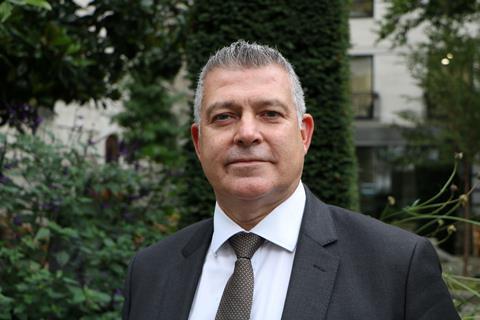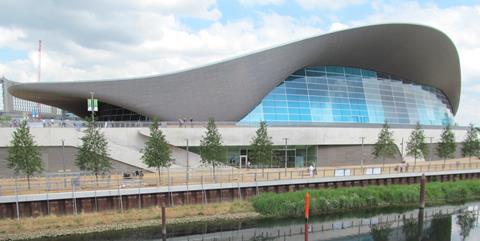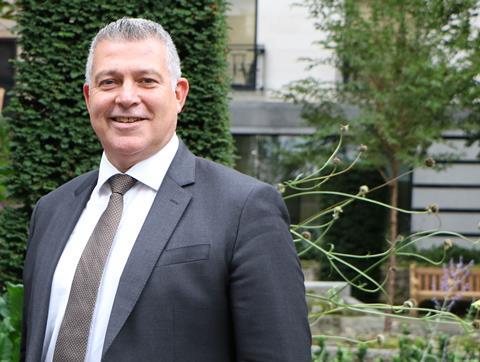The man who helped to set up the firmãs consulting arm tells Dave Rogers what he did next

ãIãm very proud to say: I was the only QS that was invited.ã
Steve Mason is recalling the time when he turned up to Steve Pycroftãs leaving bash at The Ivy in London, himself a few weeks into saying goodbye to the firm where he had spent close to a quarter of a century.
Back in his 20s, Mason had been recruited to the business by Pycroft, Maceãs then chief executive, ãwhen an interview with Mace was over a gin and tonic in the Oxo Tower ã that used to be his favourite restaurantã. Mason thought he might go into Maceãs legal team because he had recently completed a masters degree in construction law from Kingãs College, London, and he liked it. But he made his name in cost consulting instead.
He left a few months before Pycroft announced that he, too, was off in the autumn of 2021.
In an interview with ¤ÖÑÇèÓú½ in 2021, Pycroft admitted that he missed the rough and tumble of the old days, when deals could be done in a pub or over the phone and when conversations were, well, a bit more unreconstructed.
ãI wonãt hide from the fact that Iãm a dinosaur,ã Pycroft said then. ãThe dinosaurs are dying ã and Iãm one of them.ã
Mason wryly notes that his departure and Pycroftãs were unconnected, then laughs and says: ãWhen Steve used to do a comms session, he would spend half the time apologising for the previous sentence.ã
But relationships always mattered to Pycroft and Mason says that, when he resigned, Pycroft was the first Mace director to call him. ãI left with their blessing. They dealt with it very nicely.ã
My role changed so much, it was not for me anymore
He adds: ã[Pycroft] would say Mace would build the jobs that no one else would want to build. Thatãs why they did the London Eye, the Shard, the GLA building. Thatãs what they did. You learn what good looks like. It was a bit like a machine.ã
He worked on all three of those projects as well as the London 2012 aquatics centre, the one designed by Zaha Hadid which was likened to a Pringle. ãI did enjoy being involved in the early stages of that job.ã
He also worked on the redevelopment of 5 Broadgate, having already been a fan of the wider scheme because it was part of his QS degree at Thames Polytechnic. It was built by Mace and designed by Make, although original Broadgate developer Sir Stuart Lipton wasnãt much of a fan, describing the building as ãthe worst in the City for 20 yearsã.
But, as time wore on, Mason says too many changes were happening at Mace for his liking. ãMy role changed so much, it was not for me anymore.ã
One morning, he went in to sign his new contract but, as he was about to put pen to paper, he decided that he simply couldnãt. He went home that evening, told his wife he was thinking of leaving and it was her reaction that was most telling. ãShe said, ãthank goodness for thatã. I just wasnãt enjoying myself.ã
He resigned the next day, without a job to go. ãEveryone thinks I did, but I didnãt. I thought, Iãll do something new.ã

Mason is important to the Mace story because he was one of several people, including former Gardiner & Theobald partner Chris Goldthorpe, who helped to set up Maceãs cost consulting business in 2004 at a time when Mace was best known for construction management. It was initially known as Sense, changing its name to Mace six years later, with Mason taking over at the start of 2017 after Goldthorpe retired.
>> See also: Goodbye to The Godfather: Steve Pycroft interview
>> See also: 2012 forever: Revisiting the London Olympics
When Mason helped to set up the business, it had 14 people. When he left, it was close to 450 staff and bringing in ôÈ25m in fees.
Leaving Mace ã which by that time had morphed from a boutique contractor to a main contractor and consultant ã was a jolt to the system. ãI thought Iãd retire there, he says. And so he took a few months off. ãI just chilled out.ã
He resurfaced at Gleeds, having been brought in to run the firmãs London office, but he spent less than two years there.
When I finish work, it will be on my terms and Iãll decide when Iãve done what I want to achieve
Mason and Douglas McCormick, who joined the consultant at the start of 2020 as the executive chair of its UK business, went at the end of 2023 and Mason says that, in the end, things didnãt quite work out. ãIt was an amicable ãthank you very muchã and we parted company. I donãt regret going there. Everything is a life experience.ã
So he and his wife Nicola, who have three grown-up children aged 29, 27 and 21, did a bit of travelling. He liked it and admits: ãWhen youãre travelling around the Caribbean, itãs very easy to think, ãactually, this is quite niceã.ã
But he adds: ãWhen I got back to the reality of not doing stuff, I needed to start thinking properly about what I wanted to do. It was a rainy day in April, I was at home and I looked out of the window and I thought, ãJeez, I had better start looking for another jobã.ã

Mason. who has just turned 56, adds: ãWhen I finish work, it will be on my terms and Iãll decide when Iãve done what I want to achieve,ã he says.
After his April epiphany, he got a call about a role at Avison Young and, last June started as principal and managing director of its building and project consultancy business in London.
The firm has recently moved to new offices off Tottenham Court Road from its home of the past few years at 65 Gresham Street ã which is now due to be redeveloped by Mace.
ãSixty-five didnãt feel dated to me [it was built in 2001] until we did our new office. Itãs much more contemporary.
ãWith this office, it has been very much a team effort. A lot of people have bought into the new place because they have got skin in the game.
ãThe best way to get people to buy into a business is getting them involved and giving them a little bit of influence over the direction itãs going in and where youãre going to be living.ã
The office has space for more than 450 people ã 458 to be precise ã and Mason is in charge of around 130 of them. He wants his bit to be around 200 staff in five yearsã time bringing in fees of around ôÈ30m, up from the current ôÈ18m.
ãThe attraction for me was the opportunity to grow a really good business with an excellent list of clients and the quality of people we have here.ã
His portfolio includes project management, surveying and cost management. He says Avison Young is probably better known in the capital for its project management expertise, having bought GVA more than six years ago which in turn had bought project manager Second London Wall in 2003.
He says the firm should be aiming to be a top five project management business in London while he says the QS business can benefit from the washing machine effect of the changes in London cost consulting. Names have disappeared, others have been bought and Mason says: ãSo much is changing in our marketplace, it creates lots of opportunities.ã
Steve Mason CV

June 2024 - present Principal and managing director, Avison Young
Jan 2022 - Nov 2023 Regional managing director and UK board director, Gleeds
Steve Mason spent close to 24 years at Mace
Sept 1998 - Nov 2021 Mace, including co-founder of Mace cost consultancy and global head of cost and commercial management
His business has around 15 cost consultants which he says can hit 50 by the end of the decade. It does commercial office work, occupier fit out and retrofit work but adds: ãWe should have a much bigger slice of the pie.ã
Its core markets remain commercial and residential work but Mason says the business is broadening into other sectors such as health and the wider public sector. ãMy aim is to be one of the leaders for the provision of health and we need to widen our presence in the public sector.ã
But the firm is not abandoning commercial or residential work. ãWhen those markets start growing again, we need to be in the best place to take advantage of that.ã
He thinks a recovery has been delayed by several months until later this year and laments the issues which firms like his have been facing over the past decade: ãThereãs lots of different challenges we now have that we didnãt have 10 years ago. First it was Brexit, then it was covid, the war in Ukraine, more recently the tariffs. I canãt remember such a long period of uncertainty as weãve gone through.ã
The big sticking point right now is getting clients to sign jobs off. Things like tariffs have consequences with jumpy funders. ãThese schemes which already have board approval have to go back upstairs to get signed off again,ã he says. ãThatãs the challenge.
ãThe release of projects is just slower. We get a lot of appointments for feasibility work, it takes a little while for that to start to manifest itself. The challenge is making things work [financially].ã
And the longer jobs take to get signed off, the more the price of them goes up. ãIf youãve got a job thatãs got a long procurement period ahead of it, you can be lumping on top of it 10% to 15% just for inflation ã and that just kills the job.ã
Because main contractors are more choosy about the jobs they do, the cost of building out jobs goes up as well. ãWith the premium you pay for taking that risk on, some of these projects donãt work, they become unviable.ã
He says one way around it is to use more construction management contracts. ãWe still have this approach where too much risk is loaded onto contractors and most constructors blame that on QSs.
Agile and flexible working is great once you know your job and what youãve got to do. When youãre learning, I struggle to see how people can do that remotely
ãItãs not the QSs. There needs to be a refocus on not trying to offload as much [risk], which seems to have happened over the last few years and you end up with a supply chain thatãs limited because firms have gone bust or become choosier.
ãI do think CM gets discounted because of a lack of cost certainty, but I would argue that, while you might not get an overall fixed price, you still get cost certainty on the job ã it just might be a bit further down the line.ã
He says Avison Youngãs office move is an important part of its strategy in the coming years. He likes being in an office and says they are still the places where the best learning is done.
ãI do have concerns about younger people coming into the industry. For me, all graduates and apprentices really should be in the office full time so they can learn. Agile and flexible working is great once you know your job and what youãve got to do. When youãre learning, I struggle to see how people can do that remotely.ã
For many, he makes a valid point but admits nothing is prescriptive. ãMaybe future leaders will have worked in a different way.ã
He has made some concessions, though, as he has got older. ãI used to wear a tie for years. Itãs taken me nine months here to try and actually stop wearing one.ã
A brief history of Avison Young
Canadian firm Avison Young was set up in 1978 and takes its name from founders Ted Avison and Graeme Young. The firm now employs more than 5,000 people in over 100 countries across 20 offices.
Its London office was at 65 Gresham Street but it has recently moved to Tottenham Court Road, where there is space for more than 450 people.

Its current projects include the Salisbury Square scheme, being built by Mace, for the City of London where it is project manager while it was both cost and project manager on the scheme to turn the former flagship of collapsed fashion retailer Top Shop into a new Ikea store at 214 Oxford Street, completed by McLaren and which opened in early May.
The firm is also working as project manager on a new theatre designed by Haworth Tompkins at the Olympia redevelopment in west London, being built by Laing OãRourke.























No comments yet